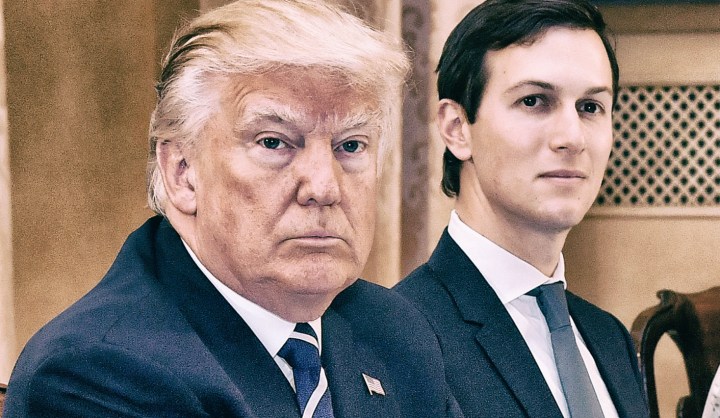INTELLIGENCE MATTERS
Trump’s responses to his intelligence community draws attention to his own mental capacity

There is a common thread that runs through the Russia election interference probe, the killing of Jamal Khashoggi, and President Donald Trump’s continuing unwillingness to accept any determinations from his country’s intelligence agencies, despite any and all mounting evidence. And that thread points to a core principle of Donald Trump’s presidency.
Yes, it already seems like it was an eternity ago, the first time Donald Trump was confronted directly as to whether or not he accepted the united judgement of America’s intelligence community that there had been a sustained campaign by Russia to affect the outcome of the 2016 election (in his favour).
At that time, he had memorably spluttered that it could have been Russia, or China, or North Korea. And then he added his expert judgement that it might also have been a 400-pound guy in New Jersey, sitting on the edge of his bed, dong all that electronic meddling and destruction. Snicker, snicker; wink, wink; nudge, nudge; vada VOOM!
This, or course, had come after he had already publicly appealed to WikiLeaks and its founder, Julian Assange, to hack and release as many of Hillary Clinton’s emails as possible, in order to further embarrass her, her party, and her 2016 presidential campaign. There was his memorable shoutout at a campaign rally, “I love Wikileaks!” Remember?
And that had just happened to come along even as various of his campaign aides and family members were cosying up to some shady, especially suspicious, presumed Russian agents provocateur who were hinting they could spill still more dirt on his opponent. Beyond that, of course, was the veritable universe of social media false flags, bots, and various other electronic disinformation efforts.
As we all know now, special prosecutor Robert Mueller has been quietly but doggedly chasing down the many twisted tendrils of the hacking – the incidental, the coincidental, and the consequental collaborations, and the possibilities of some real criminal conspiracy-type collusion between the Trump campaign and the many faces of that illicit Russian electoral engagement. If the extremely limited hints coming from the prosecutor’s team are accurate, all the prosecutor’s men are coming ever closer to wrapping things up – and further indictments beyond the first three dozen are to be expected soon enough.
There is further evidence that things are coming to a sharp point. Now that the president is reportedly finishing his written answers to the prosecutor’s questions – assuming Rudy Giuliani, in his capacity as gadfly and presidential legal adviser, can figure out which side of the question he is on – the prosecutor’s team may get what they came for, either proof of the whole nasty business or dissembling on the part of the president, or both.
Most frequently, the president, even as he has been framing his answers, continues to spin out a stream of tweets and public spluttering about the horrendous depravity of this investigation. But this campaign of attack has now become a kind of template for Trumpian rhetorical excess against any attack on – in his mind – the legitimacy of his victory in 2016. Such a conclusion would throw real shade on him – that his victory came courtesy of another country’s efforts would cast the deepest possible shadow.
But now, even beyond the thumping of Trump’s Republican Party in the recent midterm election with its loss of control of the House of Representatives, yet another challenge to Trumpian legitimacy has come along – even as it leans on two other key elements of the president’s mental apparatus and weltanschang. These two pillars are: first, his overwhelming preference for embracing authoritarians in other nations such as Vladimir Putin, the Saudi royal family, or North Korea’s Kim Jong-Un; and second, his predilection – close to religious fervour – to search for the transactional element of every foreign engagement, rather than see any moral argument or any values dimension within his itch “to make deals”. And of course, here we are speaking to the larger implications of and the fallout from the death of Jamal Khashoggi.
To review, Jamal Khashoggi, a Saudi national living in the US and who was a Washington Post columnist and a serious critic of the Saudi political, social, and royal system, had entered the Saudi consulate in Istanbul in October 2018. Reportedly, it was to obtain a needed document about his earlier divorce so that he could then marry his Turkish fiancé.
But, after entering that building, Khashoggi never reappeared. It is now generally agreed – on the basis of partially released Turkish intercepts reported publicly and reports of eavesdrops and electronic traffic obtained by American intelligence services – that agents of the Saudi government arrived in Istanbul to kill Khashoggi, dismember him, and then dispose of his remains secretly. And, crucially, they were there to carry out the instructions of the highest levels of the Saudi government. (While all this has been happening, an Indonesian woman working as a housekeeper in Saudi Arabia was beheaded for killing the employer who was trying to rape her.)
The global uproar against the Saudis over the killing of the columnist shows little sign of dying down, and, increasingly, it is being directed towards Crown Prince Mohammed bin Salman, the son of the current king, and the man who effectively rules the kingdom. Crucially, he has forged a close relationship with Donald Trump’s son-in-law and senior adviser, Jared Kushner. This growing ire towards the kingdom also speaks to its central role in the ongoing human tragedy that is now Yemen. The Saudi military role in Yemen has been opposing Iran’s own intervention there (and Saudi military engagement has been supported heavily by the US). Saudi action is coming under increased criticism with the mounting civilian toll from Saudi Arabia’s use of Amerucan-made hi-tech weaponry, amid an imminent countrywide famine and spreading epidemics.
Throughout all of this, the Trump administration – and the president more personally – has clung tightly to a partnership with the king, the crown prince, and their country. This is a partnership built on business partnerships before Trump became president, as well as the Saudi role in creating increases in global petroleum supplies to counter the decrease in Iranian oil exports due to the reimposed US sanctions regimen. This is important now that the US has withdrawn from the six-nation accord with Iran designed to restrict its nuclear and missile ambitions.
This tight embrace of the Saudis has also been pushed hard by Jared Kushner as part of his big picture strategy to nurture a broader anti-Iran front and thus simultaneously bolster the American alliance with Israel. This whole scheme was sealed by Trump’s state visit to Saudi Arabia back at the beginning of his administration – complete with that rather cheesy sword dance and the truly weird love-in over a basketball-size, glowing crystal orb. What was that all about, anyway?
Thus, when Khashoggi’s disappearance and his almost certain violent demise first broke into the news, and as the signs increasingly pointed to the Saudi crown prince as the principal Svengali behind it, Donald Trump obdurately clung to a whole series of spurious versions of the crime proffered by the Saudi government. First was that no one knew what happened or where Khashoggi was; then that some kind of rogue conspiracy had infiltrated its way into the Saudi consulate, somehow, to do the deed, whatever it was. And, as the evidence continued to pile up, Donald Trump continued to push back against any idea that the hands of the Saudi government or the crown prince were directly complicit in Khashoggi’s disappearance, let alone his ultimate demise.
By the end of this past week, however, the American CIA had undertaken a virtually unprecedented move of stepping out beyond the usual channels to point rather directly at the Saudi givernment and its royal overlords as the guilty parties.
As the Washington Post reported:
“It has been abundantly clear from day one that President Trump does not want to blame Saudi Crown Prince Mohammed bin Salman for journalist Jamal Khashoggi’s death. Trump has even said as much: ‘I hope that the king and the crown prince didn’t know about it,’ he said Oct. 17. Even as Trump has occasionally offered tough words, none of it pointed to the top, and most everything Trump has said has offered an alternative narrative that doesn’t implicate Mohammed.
“That wishful thinking now meets reality, but Trump appears primed to doubt his own intelligence community and/or fail to act upon its conclusions on an issue of huge international import. Again.
“The Washington Post reported late Friday that the CIA now has high confidence that Mohammed personally ordered the killing of Khashoggi, a Washington Post contributing columnist and former ally of the Saudi royal family who became a critic. This contradicts the official Saudi explanation, which is that Mohammed’s deputies merely ordered the repatriation of Khashoggi and the team sent to Istanbul instead killed him.
“The situation — and Trump’s position in it — now carries eerie parallels to the Russia investigation. The U.S. intelligence community concluded Russia interfered in the U.S. election and favoured Trump, but Trump has spent most of his presidency publicly casting doubt on this and resisting punitive measures. His administration has still punished Russia. But Trump, whose personal interest in doubting Russian interference is clear (he feels it undermines his 2016 election win), has frequently been a less-than-willing participant.
“And just like then, the Post is reporting Trump remains sceptical of the finding that the prince was responsible — despite the evidence: President Trump has resisted pinning the blame for the killing on Mohammed, who enjoys a close relationship with Jared Kushner, the president’s son-in-law and senior adviser. Privately, aides said, Trump has been shown evidence of the prince’s involvement but remains sceptical that Mohammed ordered the killing.
“The president has also asked CIA and State Department officials where Khashoggi’s body is and has grown frustrated that they have not been able to provide an answer. The CIA does not know the location of Khashoggi’s remains, according to the people familiar with the agency’s assessment. Trump said Saturday that he hadn’t been briefed on the matter yet and that he would be speaking with the CIA. But aides say he’s seen evidence implicating Mohammed and looked for ways to avoid pinning the blame on him.”
What seems clear from both these crises – Russian election tampering and Khashoggi’s death – is that in the newest one, the Trump administration and the president himself do not want to finger the Saudi crown prince and government because great pressure would then be on the Trump administration to take forceful measures against Saudi Arabia (perhaps scaling back military sales), despite their predilections to keep on course. And such an eventuality could unravel virtually all of the Trump-Kushner Near East policy.
But here’s the kicker – Donald Trump admits that the Saudi leaders did pull the figurative trigger, and as he accepts the CIA’s determination that that is what happened, the next logical question must be: If you accept the intelligence community’s determination in this case, why can’t you accept the entire intelligence community’s uniform position on the Russian 2016 election hacking and their efforts to undermine the 2016 election? And that, of course, would be the beginning of accepting the questionable legitimacy of his victory, his resulting mandate, and then, eventually, his entire presidency. Given that skein of events, it is easy to see why waving off the findings of the intelligence community on Khashoggi is a no-brainer for Donald Trump. Regardless of any truths in the matter. DM



















 Become an Insider
Become an Insider